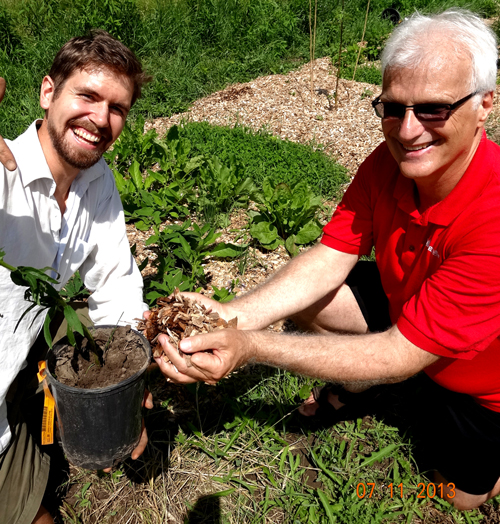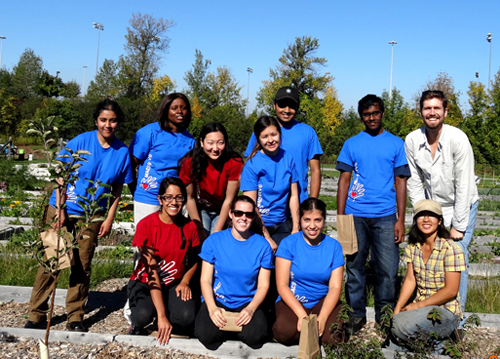
Despite the cold and ice of winter, Paul Wartman is thinking about green plants, bugs and fungi. The U of G graduate student is researching the benefits of mimicking natural ecosystems when it comes to growing our own food through the creation of edible forest gardens.
In fact, he’s hoping to change the way we grow our food from vast rows of fossil fuel-dependent crops to smaller, more diverse gardens filled with perennial food-producing plants.
“Mother Nature is an expert at efficiency,” says Wartman, who is in his first year of a master of science in the Department of Plant Agriculture. “If you look around at our natural environment, you will see that it can sustain itself without our intervention. We need to look at these self-sustaining systems and co-create with them so that we can grow our food as naturally as possible.”
The concept is known as permaculture, which is based on permanent agricultural systems. The idea is that by planting edible trees, shrubs and other perennial plants that work together and share resources, there will be a continuous production of food with minimal labour and disturbance to the environment.
As part of his research, Wartman has planted plots of apples trees in three locations in Guelph and Mississauga for a total of 32 trees. He is comparing standard farming practices to permaculture practices by growing the trees under different conditions at each site and then studying the soil quality and soil microbial communities.
“I am trying to figure out how we can create a food-producing ecosystem that fosters a diverse and abundant soil microbial community because they are the best workers,” he says.
The trees at each site have had one of four conditions randomly applied to them. Some of the trees are surrounded by diverse perennial plants to form an edible forest garden while others are surrounded by grass, and some have had turkey manure compost added to the soil. In the end, Wartman is hoping the results will show that an edible forest alone can provide enough nutrients in the soil for the trees to flourish.
When designing the edible forest garden, Wartman planted a variety of perennials around the apple trees. “Instead of replanting year after year, you just have to plant the perennials once and then they become a home for bugs and fungi that will create food for the trees and help them grow.”
These natural systems also attract pollinators as well as birds and insects that can act as predators to pests, he says. Wartman explains that the plants themselves help take up space in the ground to prevent unwanted weeds from popping up. “By creating a natural environment, you are providing all the support the apple trees need, so you don’t need to add anything such as pesticides or fertilizers.”
When creating an edible forest garden, Wartman says you should observe the surrounding environment to see what plants are naturally growing in the area. However, there are certain plants that can be particularly beneficial to food crops, he adds.
The plants he has placed in the edible garden sites include lupine, white clover and comfrey. All of these plants have leaves and roots that are high in nutrients; when they decay these nutrients are released into the soil, he says. Within edible forests you can also plant secondary crops that grow low to the ground. At his sites, Wartman has planted chives, onions and mint.
For the research study, he has collected soil samples before planting the trees and will continue to take samples twice a year for two years to compare the difference in diversity and abundance of soil microbes before planting and after, as well as the difference between conditions.
Wartman, who grew up in the suburbs of Mississauga, knew little about permaculture until he discovered the Guelph Centre for Urban Organic Farming on campus during his undergraduate degree in physical sciences. Now he not only follows the permaculture lifestyle but also established a new initiative called Many Rivers Permaculture in January 2013 to help educate others about edible forest gardens.
Members of the group have joined Wartman on visits to his various research sites to see an edible forest in action and to learn the practice. The group is run in partnership with the Ontario Agricultural College, the Guelph Centre for Urban Organic Farming, Ecosource and Ignatius Farm.
Wartman hopes that by introducing people to the idea of growing food through permaculture, he can encourage them to become more environmentally conscious.
“By growing your own food, you establish a relationship with the environment,” he says. “You realize that what you put into the environment, you are putting into your food, and by eating that food it becomes part of you.”
He plans to use his research findings as a springboard for further outreach projects, including designing a guidebook geared towards teaching children in urban areas how to grow their own edible forest gardens.
“I would love to get an edible forest garden on every school, church and home property,” he says. “Often research is published in a journal and then put on a shelf, but with this research, I want to make sure it’s used.”
To follow Wartman’s research and learn more about edible forest gardening, visit www.wearemanyrivers.ca or find Many Rivers Permaculture on Facebook.
